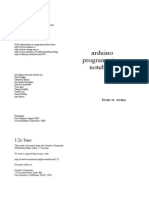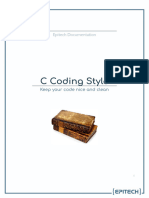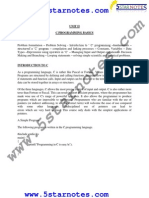C Programming Style Notes: Compe375 Embedded Systems Marino Fall 2012
Uploaded by
a42ortizC Programming Style Notes: Compe375 Embedded Systems Marino Fall 2012
Uploaded by
a42ortizCompE375 Embedded Systems
Marino
Fall 2012
C Programming Style Notes
A C program is a collection of variables and f nctions! A partic lar application can be implemented "it# different programs$ t#at is$ "it# different collections of variables and f nctions! %rogram design is largely t#e process of selecting t#e variables and f nctions t#at "ill comprise a program! &#ere are a fe" generally accepted C programming design r les' 1! (ariables and f nctions s#o ld be given names t#at s ggest t#eir role in t#e program! )&#is "ill ma*e t#e program easier to read and nderstand!+ 2! ,ocal variables s#o ld be sed in preference to global variables nless t#ere is a good reason for sing a global variable! )-lobal variables invite errors beca se t#ey are accessible to all f nctions!+ 3! &#e primary criteria for selecting t#e partic lar f nctions and variables sed to implement an application is simplicity! A program s#o ld be as easy to read and nderstand as possible! A C program may also be regarded as a te.t doc ment! &#at is$ t#e f nctions and variables t#at comprise a program are represented sing te.t! /n addition to t#e above program design r les$ t#ere are also programming style r les )or g idelines+ for constr cting t#e te.t doc ment t#at represents t#e program! Most of t#ese r les involve t#e se of 0"#itespace1$ t#at is$ t#e se of spaces$ tabstops$ and ne" lines to gro p te.t c#aracters into meaningf l nits! Follo"ing are some generally accepted programming style g idelines! Controlled 2loc*s A 0controlled bloc*1 is a gro p of statements t#at is controlled by a 3 alifying condition in a selection or iteration str ct re )follo"ing *ey"ords if$ else$ "#ile or for+! &#e compiler identifies a controlled bloc* sing c rly braces )"#ic# may be omitted if t#e controlled bloc* #as a single statement+! 4#itespace s#o ld be sed in addition to c rly braces to #elp t#e reader identify a controlled bloc*! 5elated style g idelines are' 2e consistent in t#e se of c rly braces! &#e opening c rly brace s#o ld be eit#er after t#e *ey"ord p#rase$ for e.ample if () { or directly belo" t#e first letter of t#e *ey"ord on t#e ne.t line$ for e.ample if () { %ic* one and se it consistently! /ndent all statements in t#e controlled bloc* by t#e same amo nt! &#e amo nt of indentation s#o ld be 2$ 3 or 6 spaces! 2 t again$ be consistent )e!g!$ al"ays indent a controlled bloc* by 3 spaces+! &#e closing c rly brace s#o ld be directly belo" t#e first letter of t#e *ey"ord! (ertical 4#itespace )ne" lines+ 7se vertical "#itespace to separate parts of a program into distinct nits! For e.ample$ s*ip a line before and after eac# f nction definition! S*ip a line before and after t#e declaration of a gro p of global variables! 8o not se vertical space indiscriminately! /t "ill lose its meaning!
CompE375 Embedded Systems
Marino
Fall 2012
Comments (ariable names and f nction names s#o ld be "ell9c#osen! :o"ever$ "#en t#e tas* a f nction performs or t#e p rpose of a variable is not clear from its name$ incl de an e.planatory comment! 4#en t#e p rpose of a section of code is not clear to t#e e.pected reader$ incl de a comment! Adopt a consistent style for ma*ing clear to t#e reader "#at statement)s+ a comment applies to! For e.ample$ if a comment applies to a gro p of statements$ p t t#e comment on a separate line before t#e first statement$ and s*ip a line after t#e last statement! Font 7se a fi.ed "idt# font$ t#at is$ a font in "#ic# eac# c#aracter #as t#e same "idt# )e!g!$ Co rier$ Co rier ;e"$ Consolas$ Monaco$ , cadia Console+! Code lines p vertically in a more readable fas#ion! For e.ample$ a list of 69digit #e. n mbers "ill all be t#e same "idt# "it# a fi.ed9"idt# font! fixed width: 0xABCD 0x1111 0x1CC1 not fi.ed "idt#' 0.A2C8 0.1111 0.1CC1
4ord"rap in %rinted 8oc ments 8o not allo" "ord"rap to contin e a line of code or a comment on t#e ne.t printed line! /nsert ne"lines into t#e code or comment to prevent t#is from occ rring -lobal (ariables A local variable of a f nction is a parameter variable of t#e f nction or a variable declared "it#in t#e f nction! A global variable is a variable declared o tside of any f nction! &#e scope of a variable is t#e collection of statements t#at are allo"ed to refer to t#e variable! &#e scope of a local variable is t#e bloc* of statements t#at define t#e f nction )i!e!$ bet"een t#e opening c rly brace of t#e f nction and t#e closing c rly brace+! &#e scope of a global variable is t#e entire program )ass ming a single so rce mod le+! &#at is$ statements in any f nction can refer to a global variable! &#e duration of a variable is t#e time d ring "#ic# t#e variable e.ists in memory! &#e d ration of a local variable is from t#e time t#e f nction is called ntil t#e f nction ret rns! &#e d ration of a global variable is from t#e time t#e program loads ntil e.it from t#e program! &#e ad<ective static$ "#en sed in t#e declaration of a local variable$ increases t#e d ration of t#e variable' t#e variable e.ists from t#e time t#e f nction is first called ntil t#e program e.its= it is initiali>ed on t#e first call to t#e f nction$ and t#ereafter #as t#e val e last assigned in any e.ec tion of t#e f nction! -lobal variables are sef l beca se t#ey eliminate t#e need to pass information sing parameter variables! /n embedded systems programming t#ey are sed more often t#an in application programming beca se it is often convenient?necessary for an interr pt service ro tine
CompE375 Embedded Systems
Marino
Fall 2012
to access a variable t#at m st also be available to ot#er f nctions in t#e program! /t is also possible t#at t#e deb gging capabilities of t#e /8E are better for global variables! ;evert#eless$ global variables s#o ld be sed sparingly beca se t#ey are prone to s btle b gs t#at occ r "#en a global variable c#anges ne.pectedly= finding "#at f nction is c#anging t#e variable can be problematic! /n general$ global variables s#o ld be sed only be sed if t#e information represented by t#e variable is needed by m ltiple f nctions$ and passing t#e information sing parameters is nnecessarily c mbersome! A global variable s#o ld never be sed for local tas*s s c# as inde. variables for stepping t#ro g# an array or variables for controlling loops!
You might also like
- Mini Project (Ramdom Password Gernator)No ratings yetMini Project (Ramdom Password Gernator)28 pages
- 2011 Tcs Technical Interview Questions:-: Add To ShortlistNo ratings yet2011 Tcs Technical Interview Questions:-: Add To Shortlist2 pages
- List Members List Members Catch Automatic Code GenerationNo ratings yetList Members List Members Catch Automatic Code Generation87 pages
- Programming Skills Self-Assessment Matrix: A1 A2 B1 B2 C1 C2No ratings yetProgramming Skills Self-Assessment Matrix: A1 A2 B1 B2 C1 C21 page
- Programming Techniques: There Are 3 PartsNo ratings yetProgramming Techniques: There Are 3 Parts4 pages
- Technical Questions Based On C Language BasicsNo ratings yetTechnical Questions Based On C Language Basics19 pages
- Part A Questions and Answers Compiler Design - MCS 232No ratings yetPart A Questions and Answers Compiler Design - MCS 2325 pages
- Unit 1: Compiler Design: Introduction To Compiler Compiler and TranslatorNo ratings yetUnit 1: Compiler Design: Introduction To Compiler Compiler and Translator5 pages
- Modeling and Simulation in OPNET: Syed Faraz Khalid 281509No ratings yetModeling and Simulation in OPNET: Syed Faraz Khalid 2815096 pages
- Red Hat and Debianare Are Popular Distributions From Commercial and NoncommercialNo ratings yetRed Hat and Debianare Are Popular Distributions From Commercial and Noncommercial19 pages
- Remote Method Invocation: Introduction To Distributed Computing With RMINo ratings yetRemote Method Invocation: Introduction To Distributed Computing With RMI27 pages
- Process Overview: Object-Oriented Modeling and DesignNo ratings yetProcess Overview: Object-Oriented Modeling and Design4 pages
- Kuvempu University: Windows Programming - in Windows Programming The Application Programs CallNo ratings yetKuvempu University: Windows Programming - in Windows Programming The Application Programs Call9 pages
- Campus Recruitment Training Booklet 2011No ratings yetCampus Recruitment Training Booklet 201119 pages
- Ins and Outs of Oscilloscope Programming: Examples in C and Microsoft Visual BasicNo ratings yetIns and Outs of Oscilloscope Programming: Examples in C and Microsoft Visual Basic6 pages
- Assignment No. Name of Assignment Page NoNo ratings yetAssignment No. Name of Assignment Page No47 pages
- Introduction To FPGA, NEXYS2 Board, Xilinx ISE & VHDL: Lab Experiment No. 1No ratings yetIntroduction To FPGA, NEXYS2 Board, Xilinx ISE & VHDL: Lab Experiment No. 17 pages
- The Particle Computer Docu (The CCSC2SDCC Migration Guide)No ratings yetThe Particle Computer Docu (The CCSC2SDCC Migration Guide)18 pages
- CSE 425 LAB 6 Part 2 Writing A Basic Software ApplicationNo ratings yetCSE 425 LAB 6 Part 2 Writing A Basic Software Application6 pages
- Complete Scenario of LSMW: Direct Method Batch Input - Record Method BAPI Method Idoc/AleNo ratings yetComplete Scenario of LSMW: Direct Method Batch Input - Record Method BAPI Method Idoc/Ale22 pages
- CAP259: Object Oriented Analysis and Design: DeclarationNo ratings yetCAP259: Object Oriented Analysis and Design: Declaration6 pages
- Asynchronous IO With Boost - Asio - Michael Caisse - CppCon 2016 PDFNo ratings yetAsynchronous IO With Boost - Asio - Michael Caisse - CppCon 2016 PDF104 pages
- Understanding DAG and Lazy Evaluation in SparkNo ratings yetUnderstanding DAG and Lazy Evaluation in Spark12 pages
- This Study Resource Was: 1 What Are The Two Main Functions of An Operating System?No ratings yetThis Study Resource Was: 1 What Are The Two Main Functions of An Operating System?6 pages
- Exception Handling: Visual Programming LanguagesNo ratings yetException Handling: Visual Programming Languages47 pages
- Lesson 9: Polymorphism: Using Public Class Public Virtual VoidNo ratings yetLesson 9: Polymorphism: Using Public Class Public Virtual Void4 pages
- (David Phillips) Web Scraping With Excel How To U (B-Ok - CC)100% (3)(David Phillips) Web Scraping With Excel How To U (B-Ok - CC)59 pages
- CUDA Libraries and CUDA Fortran: Massimiliano FaticaNo ratings yetCUDA Libraries and CUDA Fortran: Massimiliano Fatica55 pages
- Single Producer - Multiple Consumers Ring Buffer Data Distribution System With Memory ManagementNo ratings yetSingle Producer - Multiple Consumers Ring Buffer Data Distribution System With Memory Management12 pages
- Day 2 Python Data Structure and FunctionsNo ratings yetDay 2 Python Data Structure and Functions4 pages
- CT 801 / CSE802 - Compiler ConstructionNo ratings yetCT 801 / CSE802 - Compiler Construction12 pages
- Resources PDF Trainings EC-1300-Mainframe Jumpstart-IMS DB ProgrammingNo ratings yetResources PDF Trainings EC-1300-Mainframe Jumpstart-IMS DB Programming3 pages
- 50 Top Verilog Design Multiple Choice Questions With Answers100% (10)50 Top Verilog Design Multiple Choice Questions With Answers16 pages

























































































